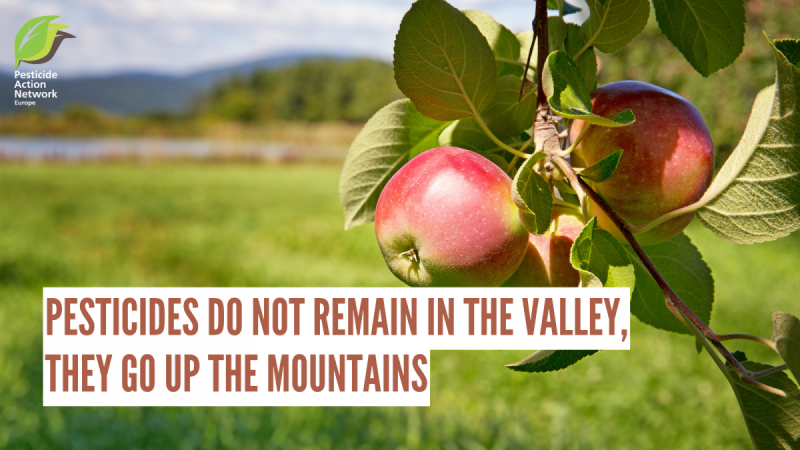The airborne spread of pesticides is seriously underestimated. A new study in Italy shows that pesticides spread in the apple-growing region of South Tyrol do not remain in the orchards. They spread throughout the valley and end up high up in the mountains. They not only affect the area of cultivation, but damage whole ecosystems.
The study was conducted in the Venosta Valley in South Tyrol, the largest apple-growing region in Europe. Its apples are known for their perfect appearance, indicating the use of large quantities of pesticides during production. The study shows that these pesticides do not remain in the cultivation area, but can be detected throughout the valley and up to high altitudes in sensitive and protected alpine regions. The pesticide mixtures can have very harmful effects on the environment.
Intensive cultivation next to sensitive alpine ecosystems
"From an ecotoxicological perspective, the Venosta Valley is particularly interesting, as the valley is characterised by highly intensive cultivation with many pesticides and the mountains are home to sensitive alpine ecosystems, that are in some cases also strictly protected," explains Carsten Brühl, co-author of the paper.
The measuring has been done by systematically recording and visualising the spread of pesticides. With a total of eleven so-called altitudinal transects along the entire valley axis, they measured stretches that extend from the valley floor at 500 metres above sea level to the mountain peaks above 2,300 metres. The team took samples every 300 metres along these altitudinal transects. Plant material was collected and soil samples were taken at a total of 53 locations.
A total of 27 pesticides detected
The sampling took place in May 2022, before the start of the main spraying season when almost 40 applications of pesticides would be common. A total of 27 different pesticides in the environment were found in soil and vegetation samples: 10 insecticides, 11 fungicides, and 6 herbicides. In soil, the insecticide methoxyfenozide was recorded most frequently in 21 (40%) of the 53 samples. This was followed by the PFAS fungicides fluazinam with 13 (25%) and trifloxystrobin with 8 (15%) detections. In vegetation, fluazinam and trifloxystrobin were detected in all but one of the 53 samples (98%). Penconazole was found in 35 (67%) and methoxyfenozide in 24 (45%) of all vegetation samples.
Pesticides in protected areas
Among the pesticides detected in the protected high altitude areas were the two omnipresent fungicides fluazinam and trifloxystrobin at all sites in conservation areas. They also found the insecticide methoxyfenozide, the fungicides azoxystrobin and penconazole, plus the insecticides acetamiprid and methoxyfenozide, and the fungicide penconazole. The frequently detected Methoxyfenozide affects moulting of insects in their larval stages and is known to cause various damaging effects at sublethal concentrations. Germany and Switzerland banned the use of methoxyfenozide due to its harmfulness to the environment.
Biodiversity as an alternative to pesticide use
The authors suggest that reducing or even better banning the use of pesticides would be the solution to save biodiversity. A first step could be to stop the use of substances that were detected in remote areas. The authorities should encourage and reward farmers to apply preventive integrated pest management and start systematic monitoring to estimate the year-round pesticide input. The authors also state that the responsibility for reducing the use of pesticides lies not only with the apple growers but also with the large supermarket chains. They could promote the acceptance of apples that do not look quite so perfect but require far fewer pesticides.
Read the full study here: Widespread contamination of soils and vegetation with current use pesticide residues along altitudinal gradients in a European Alpine valley
